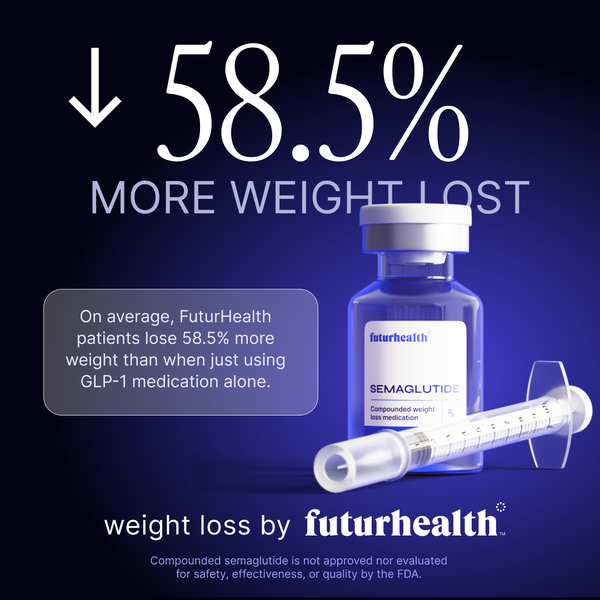
Luke Mahoney and John Levan first met a
decade ago while working at online marketing agency Bullshark, went on to co-found online nutrition platform G-Plans, and started their latest venture, FuturHealth, (FH) a year ago.
FH
combines their nutrition expertise with weight loss drugs to provide a program that Chief Product Officer Levan tells Pharma & Health Insider is designed to “get people on and off the
medications.”
On Tuesday, FH released data showing that its approach of combining compounded GLP-1 meds with customized meal plans “significantly enhances” weight loss
outcomes, compared to medication alone.
The results were particularly striking for semaglutide (the ingredient found in Novo Nordisk’s Ozempic and Wegovy), with FH reporting 58.5% more
body weight change after six months for patients on its program versus being on the medication alone. This figure was 18.3% for FH patients using tirzepatide (the ingredient found in Eli Lilly’s
Mounjaro and Zepbound).
advertisement
advertisement
Specifically, during the six-month period, FH semaglutide users lost an average 12% of their body weight and an average 25 pounds.
FH tirzepatide users,
meanwhile, lost an average 13% of their body weight and an average 30 pounds.
The study, done in partnership with InCSD, analyzed data from more than 33,000 patients.
Meanwhile, as controversy continues over whether Hims & Hers' recent Super Bowl commercial for compounded weight loss meds complied with FDA rules, FuturHealth announced a partnership with
Vailsure, an independent laboratory. The deal was made to ensure FH's compounded medications “undergo rigorous testing to check for impurities, carcinogens, and dosage accuracy.”
In just a year, FH has welcomed 3 million visitors to its site and prescribed meds to hundreds of thousands of them, Levan says.
This has been accomplished, CEO Mahoney explains, through
“a lot of digital advertising across all the major channels” -- and by working “very closely with them” in terms of policy compliance. “If you’re not working
directly with Meta, for example, your ads won’t last more than a couple of days.”
In addition to digital, social and search, Mahoney says that FuturHealth is starting to run
radio advertising across the country.
He notes that FuturHealth has a full marketing staff that includes creative directors and copywriters, but stresses that the company “is not just a
marketing play.”
“We don’t want to be known as just another telemedicine offering,” Mahoney continues.
Specifically, says Levan, “Our goal is to be a
program, not just a prescription.”
Indeed, “unlike traditional GLP-1 providers,” FuturHealth says, it “is committed not just to prescribing the medication but to
helping users transition off it, emphasizing long-term, sustainable weight loss.”
“We don’t think it’s right for somebody to just be jabbing themselves with a needle
for the rest of their lives to maintain a healthy weight,” declares Levan.
As part of the program, FuturHealth's Custom Meal Plans “are prepared fresh by in-house chefs and
delivered straight to your door,” according to the company.
In addition to GLP-1 meds and meal plans, FH’s program includes virtual doctor consultations and other support
“to build habits that last well beyond GLP-1 use.” Cost of meds and food is in addition to a $99 monthly subscription.
“Our goal is…as you're struggling, or winning,
through this journey, you can communicate and get key insights about how to eat, what to change and things like that so you can come out the other side of this program a healthier person and maybe
never get back on the meds,” says Mahoney. “That’s ultimately the goal here.”